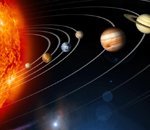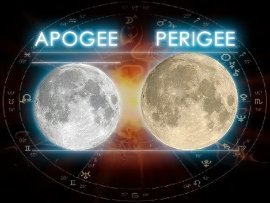Apogee and perigee of the Moon in 2017 year
The moon moves around the Earth along an elongated, elliptical orbit, making one revolution in a month. Accordingly, once a month it approaches our planet and passes the point of perigee, and once a month it moves away from the Earth, thereby passing the point of apogee.
The term "perigee" is derived from the Greek words περί "peri" - around, near, near, and Gaia Γαία - Earth and means that the mutual distance between the Moon and the Earth at this point of the orbit is minimal. The Perigee of the Moon ranges from 356,400 to 370,400 kilometers.
The term "apogee" comes from the Greek words από "apo" - from, from, and Gaia Γαία - Earth and means that the mutual distance between the Moon and the Earth at this point of the orbit is maximized. The apogee of the Moon is from 404,000 to 406,700 km. City Tashkent.
| event date | type | distance from the Earth to the Moon |
| 10-01-2017 11:08:34 tu | perigee | 363 256,96 km |
| 22-01-2017 05:17:14 su | apogey | 404 876,95 km |
| 06-02-2017 19:11:12 mo | perigee | 368 847,12 km |
| 19-02-2017 02:14:00 su | apogey | 404 335,62 km |
| 03-03-2017 12:24:47 fr | perigee | 369 094,95 km |
| 18-03-2017 22:22:22 sa | apogey | 404 611,79 km |
| 30-03-2017 17:24:23 th | perigee | 363 873,92 km |
| 15-04-2017 14:57:20 sa | apogey | 405 445,33 km |
| 27-04-2017 21:07:59 th | perigee | 359 337,30 km |
| 13-05-2017 00:37:45 sa | apogey | 406 195,10 km |
| 26-05-2017 06:14:27 fr | perigee | 357 209,75 km |
| 09-06-2017 03:05:19 fr | apogey | 406 405,56 km |
| 23-06-2017 15:45:13 fr | perigee | 357 931,47 km |
| 06-07-2017 09:17:43 th | apogey | 405 955,31 km |
| 21-07-2017 22:04:53 fr | perigee | 361 222,15 km |
| 02-08-2017 22:49:30 we | apogey | 405 057,94 km |
| 18-08-2017 18:10:24 fr | perigee | 366 096,59 km |
| 30-08-2017 16:22:50 we | apogey | 404 347,31 km |
| 13-09-2017 21:04:29 we | perigee | 369 823,27 km |
| 27-09-2017 11:51:12 we | apogey | 404 386,94 km |
| 09-10-2017 11:03:16 mo | perigee | 366 829,39 km |
| 25-10-2017 07:30:48 we | apogey | 405 188,63 km |
| 06-11-2017 05:17:14 mo | perigee | 361 423,38 km |
| 22-11-2017 00:03:23 we | apogey | 406 155,18 km |
| 04-12-2017 13:52:11 mo | perigee | 357 486,07 km |
| 19-12-2017 06:42:34 tu | apogey | 406 608,62 km |
Overall forecast

"Companion" of our planet has a specific trajectory of motion in the form of an ellipse. The nearest point of the orbit of the celestial body (the Moon) to the center of gravity, that is, to the Earth - perigee. Opposite to it - the apogee of the Moon - the most distant point from the Earth of the lunar orbit.
When the moon is at its apogee, we have increased efficiency, fearlessness. There may be excessive optimism, recklessness, like "the sea knee-deep." For example, while driving, the driver may lose caution and not feel the speed, the rhythm of the movement.
Emotionally, at this time, a person has a high degree of involvement, that is, it can be inconspicuously drawn into the "black hole" of relationships, events. On such days it is difficult to feel the edge of what is permitted and possible, therefore, the number of injuries and accidents usually increases.
At this time, you need to try not to lose control over yourself and the situation, monitor all "over-", slow down yourself, and limit the intake of any stimulants, starting with coffee. By the way, when the Moon at apogee, as far from the Earth as possible, the influence of its phases and signs of the Zodiac is somewhat weakened.

Convergence and removal of planets to the Earth
Calculated data on the maximum convergence and removal of all planets to the Earth's orbit. Go

Sunrise sunset today
Select the desired date in the calendar and find out information about the sunrise and sunset of the Sun and other planets. Go

Planetary day and hour today
The correspondence of days and hours to planets is based on the ancient Chaldean astrological order of the planets. Go

The current position of the planets
This astrological service allows you to calculate the current position of the planets of the solar system. Go






